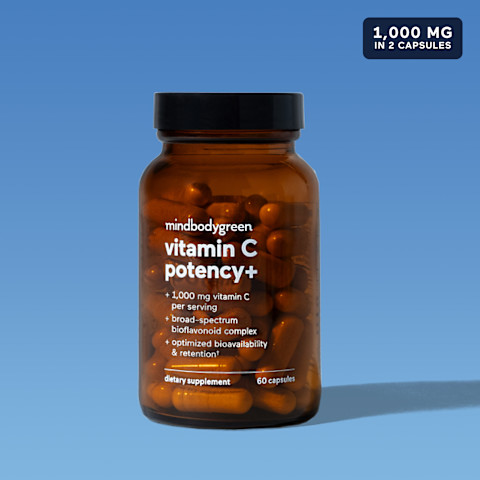Vitamin C Promotes Memory, Mood Regulation & Overall Cognitive Function*

An essential vitamin with secret superpowers, vitamin C does more than it's famed for. Found in citrus fruits, berries, peppers, and other plant foods, vitamin C provides your brain with the support it needs for optimal memory, cognitive function, and mood regulation.*
It seems like vitamin C is the original trendy vitamin that was quickly overlooked when research about vitamin D and other essential nutrients came out. But it's time to look back at this legendary vitamin and appreciate its other, lesser-known benefits, especially its surprising ties to healthy cognitive function and brainpower.*
How vitamin C promotes brain health
As it turns out, vitamin C is found in exceptionally high concentrations in the brain1, which was the first clue to researchers that the essential vitamin is important to the central nervous system. Vitamin C arrives in the brain by way of glucose transport and sodium active transport2 from the blood. Neurons (nerve cells) and glia (a network of cells that supports the nervous system) rely on the adequate and regulated absorption and transfer of vitamin C.*
Essentially, our brains crave this nutrient, but our bodies are entirely dependent on outside sources, as the body can't produce it on its own. Most mammals can make it, but some have lost the ability to do so (e.g., humans, bats, guinea pigs, and some primates).
Supporting cognitive function as we age
In a 2019 Nutrients review, concentrations of vitamin C in the blood of adults aged 66 to 90 indicate that higher circulating levels of the micronutrient are positively correlated with cognitive performance.*
Interestingly, even when C levels decline in the rest of the body due to insufficient intake (yes, that's absolutely a thing for vitamin C in modern times), concentrations in the brain remain relatively high—meaning this vitamin does all it can to compensate and protect our brains, even during mentally trying times.
Adequate vitamin C intake is especially important during the aging process, when its role as an antioxidant protects against oxidative stress that may affect cognitive function and memory.* This vitamin is not only an effective antioxidant on its own but also helps to recycle other pivotal antioxidants in the brain—like vitamin E and glutathione (aka the "master antioxidant").*
Focus, mood, motivation & memory support
Having many years under your belt isn't the only time to be concerned with your vitamin C status. Recent research from the European Journal of Nutrition has unveiled the benefits of vitamin C supplementation for young adults aged 20 to 39. In the study, supplementation "increased work motivation and attentional focus3 and contributed to better performance on cognitive tasks requiring sustained energy."*
Memory support and improved cognitive performance aren't the only brain-related benefits of this famous immune-supporting vitamin.* Vitamin C is also critical for synthesizing neurotransmitters, including norepinephrine, which plays a role in mood regulation.* Evidence for this? Glad you asked. A 2018 Antioxidants study found that individuals with the highest plasma (i.e., blood levels) vitamin C concentrations were likely to have an elevated mood4.* Sufficient vitamin C status was also inversely correlated with sadness, anger, and confusion.* Translation: Higher vitamin C levels are linked to a happier state.* (So cool).
Even before our bodies are subjected to work and cognitive demands, vitamin C plays a crucial role in healthy neurodevelopment and is involved in myelin (i.e., the sheath that protects nerves—including the spinal cord) and neuron formation.* So basically, you need vitamin C during every stage of your life.
The takeaway
Vitamin C has way more benefits than you might have realized. This powerful vitamin is vital for healthy cognitive function—including memory, motivation, and focus support.* Its role as an antioxidant and cofactor in the production of neurotransmitters make it undeniably crucial to healthy aging and a resilient mood.*
Supplementation can ensure you're getting enough of this brain-boosting vitamin each day.* Check out mbg's recommendations for the best vitamin C supplements so you can start to get a taste of the seemingly limitless benefits of vitamin C.

